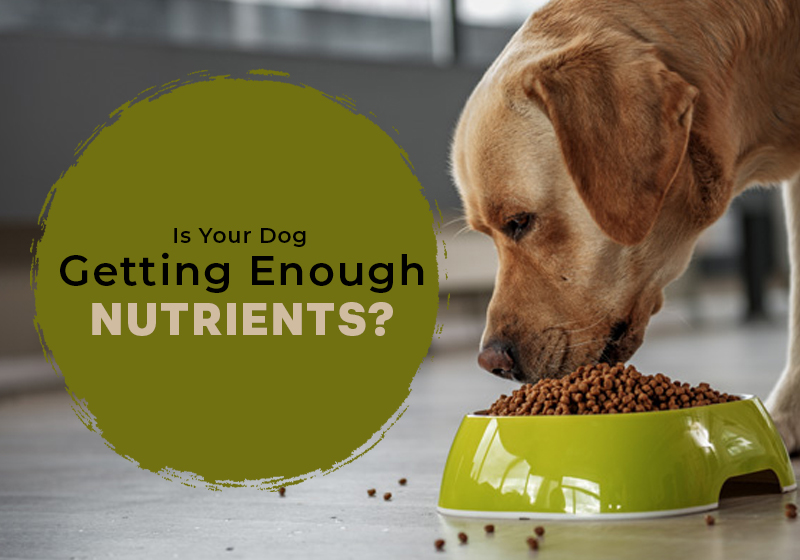With the plenty of varieties of dog food in the market, it is very easy to find a type your dog loves to devour. But, does your dog’s favorite food provide all the nutrients? Or, is it lacking essential nutrients?
This quick guide will help you learn more about nutrients your dog needs, how to spot if your dog isn’t getting them in its diet, and ways to boost your dog’s nutrition.

What Essential Nutrients Do Dogs Need?
According to pet nutrition experts, your dog should get these major nutrients to support optimum body functions:
- Water
Life is not possible without water. Water makes up to eighty percent of your dog’s weight and it is involved in carrying out crucial functions such as transportation of nutrients, digestion of food, flushing out waste, etc. Always make sure that your dog has access to clean water and is drinking enough water daily.
- Proteins
Do you know why dog parents often look out for “protein-rich” pet foods? Proteins are building blocks of muscles and tissues and are essential for maintaining strong skin, hair, and nails. Proteins are also essential for the production of hormones, enzymes, and antibodies. Good quality sources of protein include chicken, turkey, fish, lamb, eggs, and other meats.
- Carbohydrates
The primary source of glucose, the “fuel” the body uses to function, is carbohydrates. For both energy and fiber, a dog’s regular diet must include carbohydrate sources like rice, potato, millet, oats, fruits, etc. Moreover, carbohydrates also provide essential vitamins, minerals, and antioxidants which support optimum health.
- Fats
Your dog’s diet must include dietary fats. Dietary fats provide energy, aid in the absorption of fat-soluble vitamins, reduce inflammation, preserve the integrity of cell membranes, and promote the health of the skin and coat. Including dietary fat sources like fish oil, flaxseed oil, sunflower oil, and cheese may also add omega fatty acids to your dog’s diet.
- Vitamins
Although required in small amounts, vitamins are crucial for your dog’s health. Vitamins like choline, water-soluble B vitamins, and fat-soluble vitamins A, D, E, and K must be present in your dog’s food. If your dog is eating a balanced, full meal, it won’t require a multivitamin supplement, unless your dog has special health conditions.
- Minerals
Minerals are compounds that cannot be synthesized in the body. They are important for a variety of functions including oxygen transport, bone formation, nerve transmission, and fluid balancing. Some important minerals that your dog’s diet must include are calcium, magnesium, sodium, potassium, chloride, iron, copper, zinc, manganese, selenium, and iodine.
What Are The Signs Of Dog Nutritional Deficiencies?
So, how to tell if your dog is not getting enough nutrients? Here are some tell-tale signs of nutritional deficiencies in dogs you must watch out for:
- Lack of energy
- Dull coat
- Changes in feces
- Constipation
- Brittle nails
- Weight loss
- Pale gums
- Hair loss
- Skin problems
- Depression
How to Boost Your Dog’s Nutrition?
If your dog shows any of the above symptoms, your dog may be lacking essential nutrients in its food. In this case, you should first speak with your veterinarian about dietary deficiencies. Your veterinarian can suggest supplements and help you choose the best dog food to match your pet’s needs.
However, here are a few things you must keep in mind to ensure that your dog is getting enough nutrients from its food:
- Balanced Diet
Go through the ingredients list of the pet food that you are feeding. Does it provide everything he needs? The ideal dog diet must include high-quality, nutrition-rich ingredients. Furthermore, it is also necessary to ensure that your dog is eating enough portions as per their size. You can contact your veterinarian to enquire about the amount of food that your dog should eat every day.
- Health Supplements
Your dog may suffer from nutritional deficiencies even after eating good pet food if it lacks certain components required for the absorption of nutrients from that meal. In such a case, your veterinarian may recommend specific dietary supplements such as digestive supplements, multivitamin supplements, or omega-3 supplements.
- Parasite Prevention
Malnourishment can also occur as a result of parasitic infection. Pesky parasites like fleas and ticks thrive on your dog’s blood, which may result in blood loss, lethargy, weakness, weight loss, etc. On the other hand, intestinal worms may cause a loss of vitamins and minerals. To keep your pet safe from them, always keep them on a suitable parasite prevention treatment year-round.
